Table of Contents
It’s common to feel your heart racing after drinking alcohol, as this beverage can dilate blood vessels and force your heart to work a little harder. However, if your heart continues to pound for an extended period, it may no longer be a normal reaction.
In this blog post, we’ll explore why alcohol can cause your heart to race, how to calm your heartbeat, preventive measures, and when it’s essential to consult a doctor.
Heart pounding after drinking alcohol: Unraveling why
Drinking red wine or other alcoholic beverages can help you relax but can also slow down your brain, affecting how you feel, act, and stay in control. Drinking can also make it tough to think clearly and remember things (1).
You may notice an irregular or fast heart rate after drinking too much alcohol quickly (1, 40). The more you drink, the faster your heart can race (5).
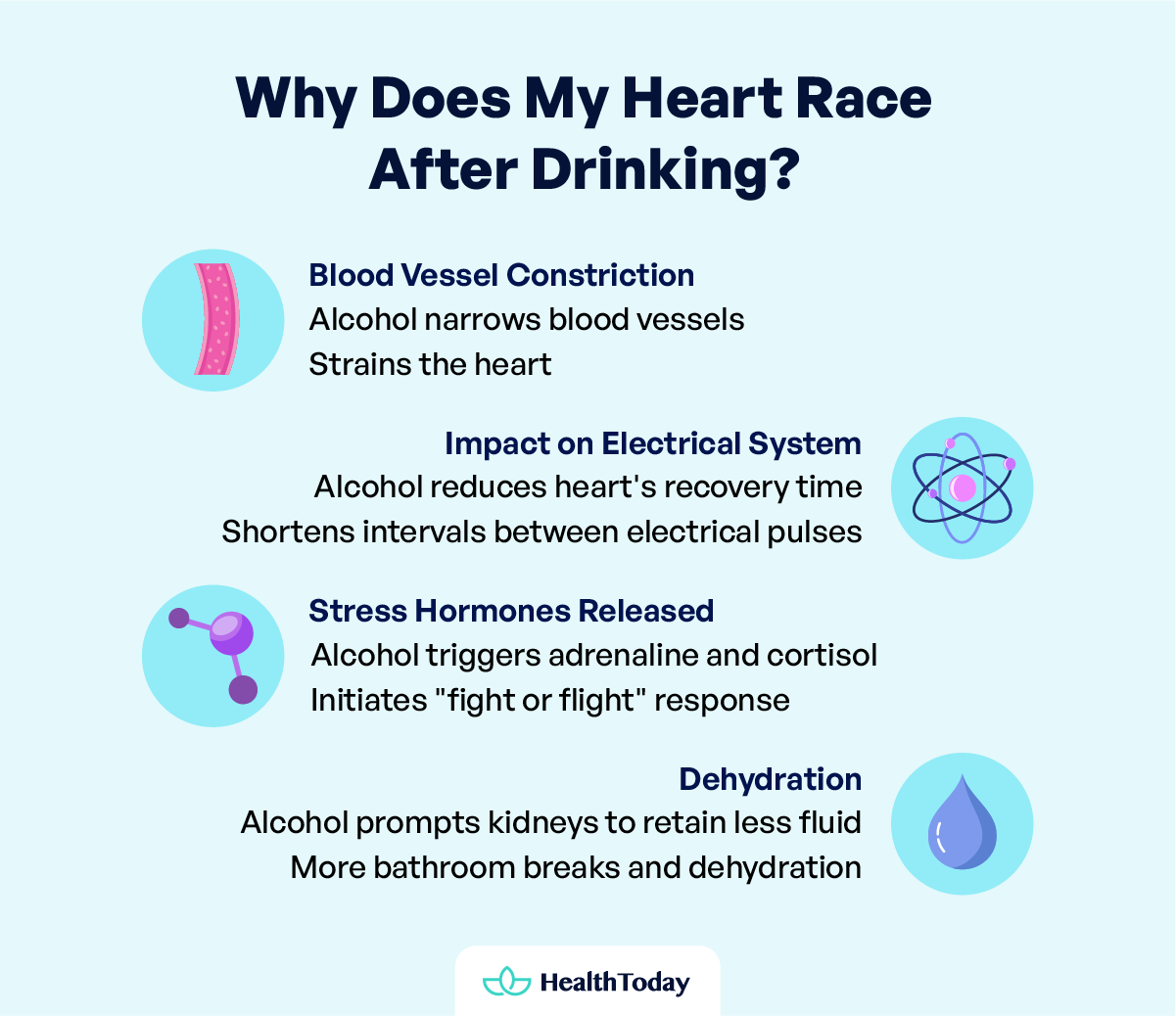
Heart races after drinking: Why and how
Alcohol, whether consumed gradually over time or in large amounts, can lead to an abnormal heart rhythm (2, 13).
In small amounts, alcohol can help widen blood vessels. However, when the intake exceeds certain thresholds (individual-dependent), blood vessels start to constrict (54). This forces the heart to work harder to pump enough blood (carrying oxygen and nutrients), which explains the increased heart rate after drinking (56).
Moreover, having a drink can significantly affect the electrical system in your heart. Alcohol makes the heart race by shortening the time it needs for your heart to recover from an electrical pulse. In simpler terms, your heart takes shorter breaks between beats (39, 52).
Alcohol can also trigger the release of stress hormones, such as adrenaline and cortisol, which are well-known for causing a faster heart rate through the ‘fight or flight’ response (60).
Alcohol is also a diuretic, which means it can reduce the hormone vasopressin that tells your kidneys to retain fluids. This leads to more bathroom breaks and possibly dehydration, contributing to a racing heart (7, 57).
Dehydration can quickly deplete your body of vital nutrients and electrolytes, such as sodium, potassium, and magnesium. Their balance is crucial for the normal function of the heart cells (19, 55). So, low electrolyte levels can trigger arrhythmias or irregular heartbeats (12, 19).

Heart palpitations after drinking: What does it feel like?
Heart palpitations are when your heartbeat feels uncomfortable or strange and can last seconds, minutes, or longer (18).
Alcohol is among the common causes of heart palpitation (13, 15), and you might feel your heart (18):
- Racing or beating rapidly
- Irregular, robust thumps with skipped or extra beats
- Pounding or thumping
Heart palpitations are usually not a big worry (18). It is common to have a racing heart after drinking alcohol, especially during celebrations or holidays, which is called “Holiday Heart Syndrome” (9).
In a small study, the non-regular drinkers noticed their heart rates increased by 15 percent after binge drinking alcohol in three hours. Twelve hours later, there was a 17 percent increase in their regular heart rate (38).
The morning after binge drinking can bring more than heart flutters. You might experience headaches, sweating, dizziness, restlessness, weakness, muscle and stomach pain, and nausea. These symptoms will fade as your hangover goes away (7).
Possible effects of alcohol on your heart health
The cardiovascular (heart and blood vessels) system is the second most affected by alcohol toxicity, after the liver and digestive system (43).
Alcohol can be both good and bad for your heart. Moderate drinking may reduce the risk of blocked arteries and heart diseases (32, 54), but research hasn’t established clear evidence for it.
If you’re a non-drinker, it’s best to stay that way. Excessive alcohol can harm your mitochondria (the powerhouses of cells), affect your fat levels, and cause inflammation (9, 34, 49). These issues can raise the risk of heart failure, cardiomyopathy, heart attack, and stroke (40, 43, 54).
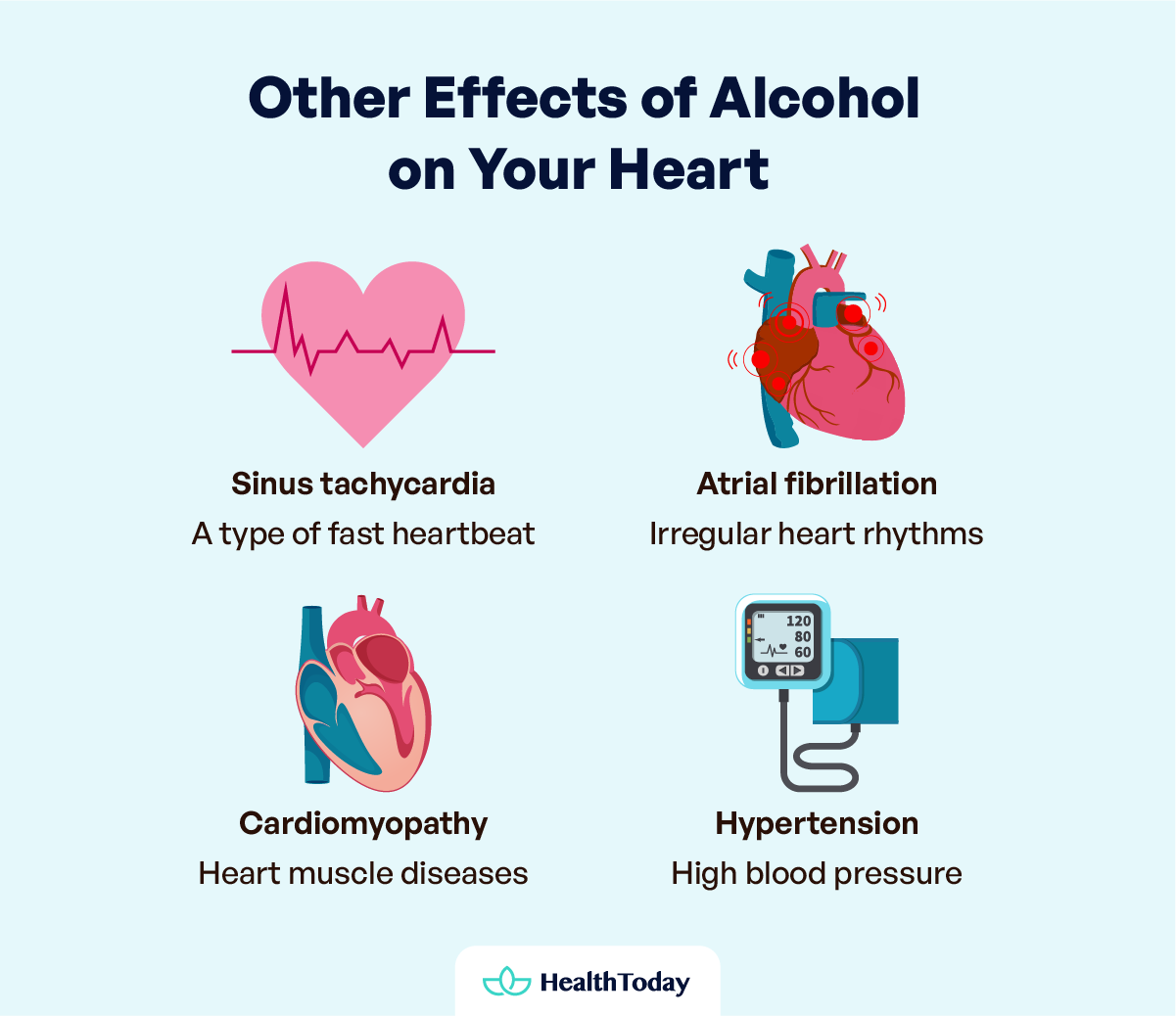

Sinus tachycardia
When a person is at rest, the normal resting heart rate is usually 50‒90 beats per minute. When it exceeds 100, it’s called sinus tachycardia, which can occur when drinking alcohol (10, 39).
In a study, young men’s heart rates tended to increase by around five beats per minute for six hours after drinking a standard drink. If they consumed two or more drinks, the heart rate went up more and stayed slightly elevated for up to 24 hours (3).
Another study happened at the biggest beer festival in the world: the Munich Oktoberfest. Among over 3000 participants who drank, 26 percent had sinus tachycardia, a risky but not deadly condition. Yet, about 5 to 6 percent had other forms of irregular heartbeats (arrhythmia), including atrial fibrillation, which is more serious (5).
Atrial fibrillation
Atrial fibrillation (AFib or AF) is the most common type of arrhythmia (58), and it disrupts the electrical impulses in the atria (the heart’s upper chambers). Seeking treatment is vital because AFib can elevate your chances of heart failure, heart attack, and stroke (32, 40, 59).
A meta-analysis review study, which involved a total of 10 million people across 13 studies, found that with each additional drink daily, the risk of AFib increased by 6 percent (32).
A study in Korea revealed that even young (under 40) drinkers, whether moderate or heavy, increased their risk of developing atrial fibrillation. The study showed that those who drank heavily for four years had a 47 percent higher risk of AFib than non-drinkers (42).
In another study of 859,420 Swedish people over 11 years, the risk of AFib also went up with each additional drink (equivalent to 12 grams of alcohol) consumed (51):
- One drink per day: increase 8 percent risk
- Two drinks per day: increase 17 percent in risk
- Three drinks per day: increase 26 percent in risk
- Four drinks per day: increase 36 percent in risk
- Five drinks per day: increase 47 percent in risk
Research also found that heart cells from alcohol-exposed people were more likely to develop AFib due to disruptions in calcium balance (9).
Cardiomyopathy
Dilated cardiomyopathy is a condition that makes the heart weaker and larger, eventually causing heart failure (difficulty pumping blood). About 10 percent of dilated cardiomyopathy cases are linked to heavy drinking (34, 43).
Drinking alcohol can damage your heart muscle cells and disrupt the collaboration of proteins that help your heart contract (33, 35, 43).
Unfortunately, there is currently no cure for dilated cardiomyopathy. Once you’ve developed it, it can’t be reversed. There is also no specific amount of alcohol that causes this condition (34).
High blood pressure
If you drink more than five standard drinks in a row, your blood pressure can increase by 4‒7 mmHg (40), which might last for 13 hours (40, 62).
To put it in perspective, at the population level, an increase in blood pressure by just two mmHg increases mortality from stroke by 10 percent, and mortality from coronary artery disease increases by 7 percent (40).
Some suggest that drinking lightly, less than one drink a day, can expand your blood vessels and lower blood pressure, but the effect may vary between genders (2, 41). A study found that in women, consuming less than 10 grams of alcohol per day lowered the risk of high blood pressure, but those who consumed 31-40 grams per day had a 19 percent higher risk. Even at 21-30 grams per day, there was an increased risk, but it was not statistically significant. In men, the risk of high blood pressure increased by up to 77 percent (31-40 grams per day), and even light drinkers (<20 grams per day) had a trend towards increased risk of hypertension, but it was not statistically significant (41).
Elevated heart rate after drinking is regular, especially if you drink excessively. You might feel heart palpitations, irregular beats, or fluttering. This happens because alcohol can affect your blood vessels, heart’s electrical system, stress hormones, and hydration.
Over time, heavy drinking can result in heart failure, cardiomyopathy, heart attack, increased blood pressure, and stroke.
How to stop heart racing after drinking alcohol?
The treatment for heart palpitations depends on their cause, and often, they do not need any treatment (18). To prevent palpitations, it’s best to either stop drinking alcohol or moderate your alcohol intake (7, 15).
If you have a hangover, the solution is to let your body recover naturally. It needs time to eliminate alcohol byproducts, rehydrate, heal, and return to normal. There are no quick fixes for your brain’s recovery (7).
Myth vs. reality
Online claims about hangover cures, such as drinking coffee or taking a shower, lack scientific evidence. Time is the only cure (7).
Mixing alcohol with caffeine (from coffee, sodas, or energy drinks) might make you feel more awake as caffeine masks alcohol’s sedative (soothing) effects. However, this ‘trick’ can also cause you to drink more without noticing (25, 48).
Some people may take over-the-counter pain relievers, typically acetaminophen, to ease hangovers. However, it is important to know that combining acetaminophen and alcohol can increase the risk of liver toxicity. Other painkillers might also irritate your stomach lining (7).
Let’s clear up the “drink order” theory, such as “beer before liquor, never sicker.” The truth is, more alcohol equals a worse hangover—even if it’s beer, wine, or the fanciest cocktails (7).
There is also a quirky idea about having a morning-after drink to tackle a hangover, also known as “the hair of the dog that bit you.” It turns out that it is a short-term fix that could prolong your hangover (7).
Dealing with a racing heart
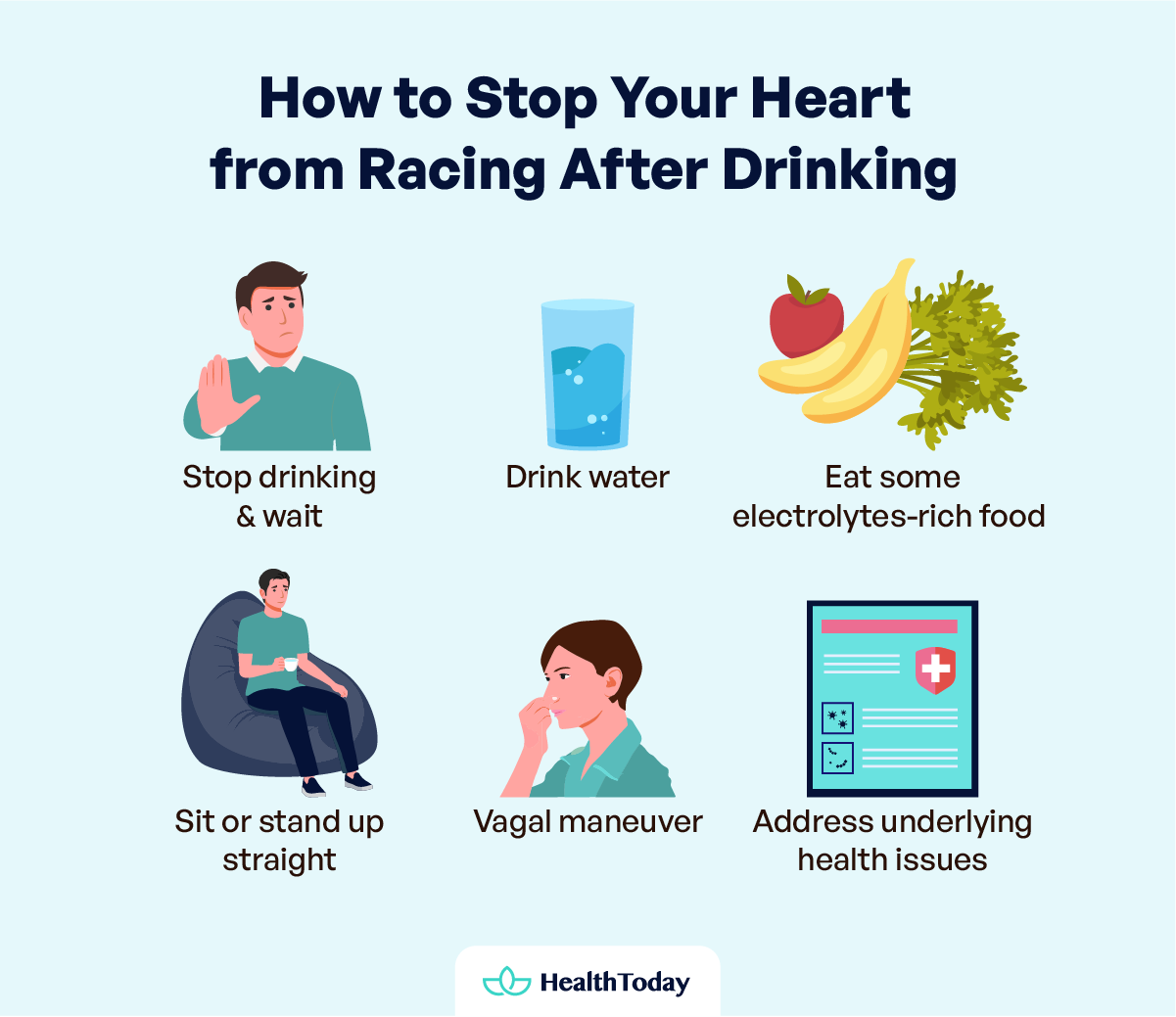

In persons with atrial fibrillation, Doctors usually set a heart rate goal in harmony with how you feel. For example, if you’re feeling symptoms from your Afib, they might aim for a heart rate falling below 85 beats per minute (9).
1. Stop drinking
The first thing to deal with a fast heart rate from alcohol is to stop drinking and wait for it to subside. To stay safe when drinking, limit yourself to one alcoholic drink per hour. (30). Ideally, only one drink per day (64).
2. Drink water
Since alcohol is a diuretic, your best move is to drink plain water. Some people recommend herbal teas, but no one is sure if there is further interaction (16, 26).
3. Electrolytes
Electrolytes, like potassium and magnesium, may play a role in heart function and could help offset alcohol-related imbalances (55). However, the theory of drinking electrolytes for hangovers hasn’t been completely confirmed by research. Plus, once the alcohol’s effects wear off, your body may quickly restore electrolyte balance (7).
Still, eating something while drinking is a good idea (27, 30), and it is better if the food is rich in electrolytes.
4. Sit or stand up straight
You can also manage your racing heart after drinking alcohol by noticing your posture. Sitting or standing up straight and leaning forward instead of lying down can help with blood circulation and ease your palpitations. If you need to lie down, roll onto your side with an ear facing the ground (23).
Afterward, rest and relax in a comfortable spot while waiting for the palpitations to pass. You can go outside for fresh air, but avoid strenuous physical activity. Instead, try deep relaxation techniques (10).
5. Vagal maneuver
You can try vagal maneuvers (massage, cough, blow out, or bear down to increase the activity of the vagus nerve) to slow down your heart rate. Yet, be careful not to overdo it and keep your breathing steady (53).
6. Don’t forget your underlying health issues
Heart racing after drinking alcohol can also be caused by underlying health issues such as fever, anemia, or heart failure. In these cases, addressing the root causes can help restore a normal heart rhythm (39).






Prevent heart races after drinking
Alcohol can lower your blood sugar levels and pressure, so eat a snack before and while having a drink (27, 30). It’s best to have a balanced and calorie-dense diet to prevent malnutrition, a possible trigger of cardiomyopathy (43).
To avoid a fast heart rate after drinking, follow the recommendations of only one drink per day for women and two drinks per day for men (64)
Try to avoid drugs—such as cocaine or tobacco—while drinking, as their interaction with alcohol can worsen the heart damage. Some have suspected that alcohol additives—like antifoam in beer with heavy metals—may produce heart toxicity, but there is no clear evidence of this (43).
Note that alcohol may have interactions with some medicines. Even on different schedules, they might collide in your body (26, 29).
From 2015 to 2019, alcohol was associated with over 140,000 deaths each year in the US. Almost half of them were owing to binge drinking (22, 65).
Therefore, the best alcohol dose for your safety is zero. The American Heart Association (AHA) also does not recommend drinking alcohol for heart health (2, 6). Instead, focus on staying active and maintaining a balanced diet (43, 61).
Here are some tips for you (24, 28):
- Count and measure. Learn the standard drink sizes and measure your drinks at home to know how much you’re consuming.
- Track your drinking. You can slow down when necessary by noting each drink before you have it—bonus points for having a friend who can help you stay on track.
- Distract yourself. If drinking has taken up much of your time, find new healthy hobbies or reconnect with old ones.
- Avoid triggers. Remove alcohol from your home and try to avoid places and people you usually spend time drinking with.
- Handle urges. Keep in mind that alcohol is a toxin and have alternative drinks. Recall your reasons for quitting.
- Say no to drinks. You may be offered a drink when you least expect it. Be prepared with a polite but firm way to refuse it. The quicker you decline, the less likely you’ll give in.
If you stop drinking suddenly, you might face some withdrawal symptoms. They are shakiness, sweating, nausea, or sleep difficulties. In severe cases, it could lead to seizures or hallucinations. Consult your doctor or an alcohol counselor to handle these symptoms (28, 29).
The best way to prevent increased heart rate after drinking is to drink less or completely abstain. Hangover symptoms usually improve with time and rehydration. Online tricks like coffee or showers lack scientific backing.
Hydration, balanced meals, deep relaxation techniques, and postural adjustments can help manage a racing heart.






High heart rate after drinking: When to worry?
An occasional fast heartbeat usually does not need medical attention (39). So, it’s generally okay for healthy adults to have a fast heart rate from alcohol.
An increase in heart rate from 60 to 80 to 100 beats per minute is typically the effect of alcohol and not a problem. However, you should be concerned if you feel palpitations or if your smartwatch detects an abnormal heart rhythm, like atrial fibrillation (5).
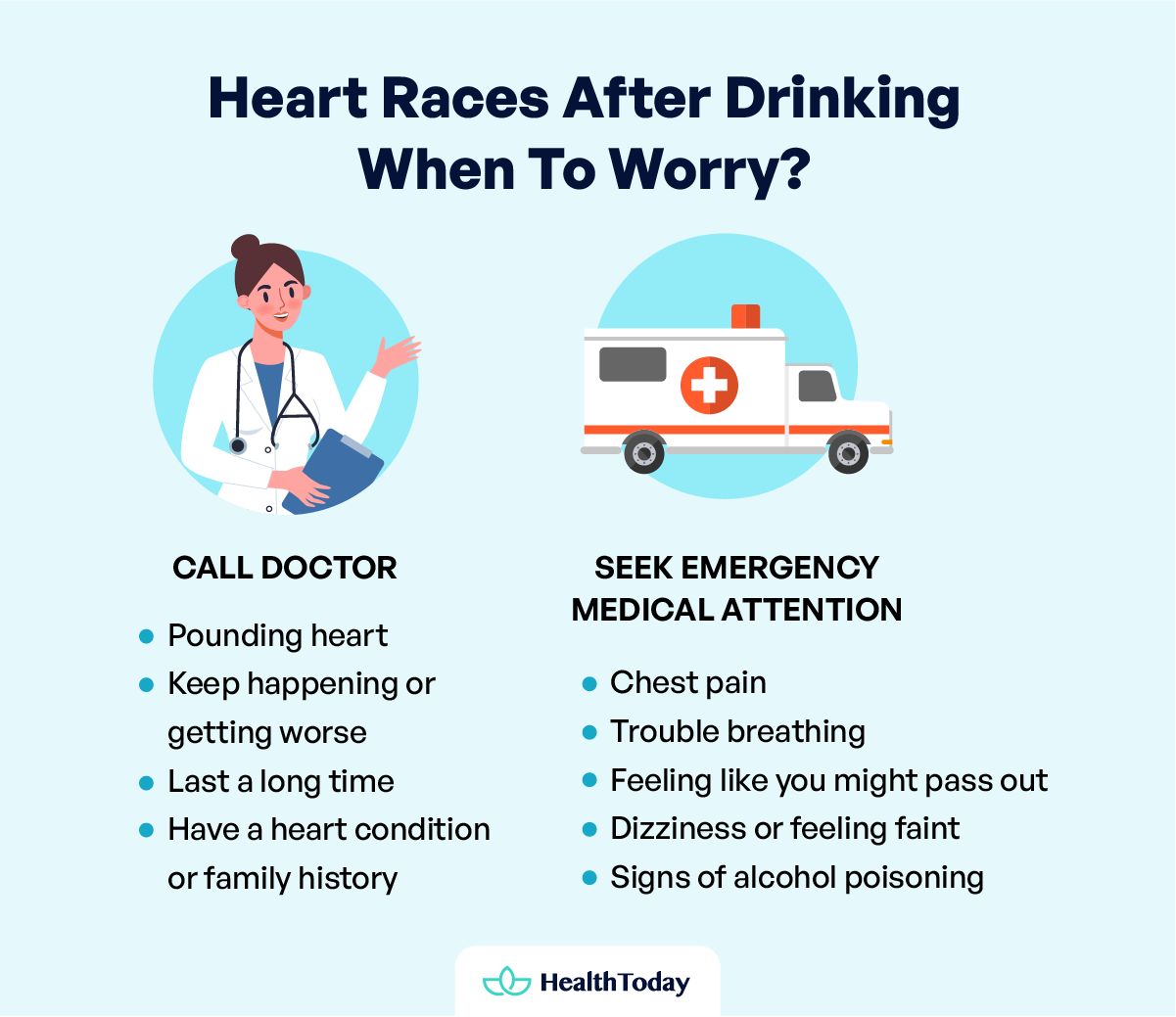

When to call your doctor?
It’s wise to seek medical attention if you have a pounding heart after drinking and (10, 18):
- These episodes keep happening or getting worse
- They last a long time
- You have a pre-existing heart condition (arrhythmias, hypertension, or other cardiovascular issues)
- Your family has a history of heart problems or sudden cardiac events
A healthcare provider can evaluate your situation, provide personalized advice, and check for underlying issues.
When to seek emergency medical attention?
If you experience any of the following signs along with palpitations, call 911 or your local emergency number immediately (10, 13, 18):
- Chest pain: It could signal a more severe issue, such as angina (chest pain due to poor blood flow to the heart) or a heart attack.
- Trouble breathing: It indicates that your heart is struggling to pump effectively.
- Feeling like you might faint (lightheadedness): It could be linked to blood circulation problems or heart issues.
- Dizziness and excessive sweating: These can sometimes result from dehydration, but they shouldn’t be overlooked.
Binge drinking can cause alcohol poisoning, shutting down some parts of your brain. It can be fatal or lead to long-term health problems. On average, six lives are lost every day in the US due to excessive alcohol consumption (17, 20).
If someone who has been drinking shows any of these signs, they should seek immediate medical help (20, 23):
- Being confused, drowsy, or lost
- Losing consciousness
- Vomiting
- Having seizures
- Cold, clammy, or pale skin
- Feeling very cold with excessive sweating
- Decreased sensitivity (such as the absence of a gag reflex)
- Difficulty breathing (fewer than eight breaths a minute)
- Breathing irregularly (pauses of 10 seconds or more between breaths)
- Slow heart rate
Don’t wait for all the symptoms to show up: someone who has passed out could die. Avoid trying to fix the problem yourself—“online therapies” or “home remedies” like cold showers, hot coffee, or walking could make things worse (7, 23).
Stay with the person to ensure they don’t fall or choke. Keep them on the ground—not in a chair—and lean them slightly forward in a sitting or partially upright position. If they are unconscious or lying down, roll them onto one side (23).






Alcohol and heart health: The risks
Remember that while moderate drinking is generally safe, it can still increase the risk of death from cancer and heart disease (1).
Excessive drinking can mean “binge” or “heavy alcohol use” (1, 23). Binge drinking is when you consume enough to reach a blood alcohol level of 0.08 percent or higher, which means having four (for women) or five (for men) or more drinks in a few hours. Heavy alcohol use is when a man has more than four drinks or a woman has more than three drinks daily (23).
How much drinking is safe?
In the US, a standard drink contains 14 grams of pure alcohol. This amount is found in (21, 23):
- A 12-ounce beer (about 5 percent alcohol)
- An 8-ounce malt liquor or flavored malt drink like hard seltzer (about 7 percent alcohol)
- A 5-ounce glass of wine (about 12 percent alcohol)
- A 3‒4 ounce serving of table wine (about 17 percent alcohol)
- A 2‒3 ounces serving of cordial, liqueur, or aperitif (about 24 percent alcohol)
- A “shot” (1.5 ounces) of distilled spirits or liquor—like gin, rum, vodka, whiskey, brandy, or cognac—which has 40 percent alcohol content
To maintain moderate drinking, women should stick to one regular drink a day. For men, two standard drinks a day set the compass (1). Even moderate drinking can still carry risks.
Who’s more at risk of racing heart after drinking?
Some unchangeable factors like aging, being male, and going through menopause can also increase the risk of heart palpitations (18). In these cases, try to drink less.
Some people should completely avoid alcohol (1, 21, 43):
- Patients with liver cirrhosis or brain atrophy
- Individuals with an alcohol problem (addiction)
- Young people (under 21 years old), as their brain is more susceptible to alcohol’s harmful effects (20)
- Pregnant women. They are more prone to arrhythmias and other conditions due to hormonal changes (14, 21). The Centers for Disease Control and Prevention also say there is no safe level for alcohol use during pregnancy due to its negative effects on the growing baby, which could lead to Fetal Alcohol Syndrome Diseases (63).
- People engage in risky activities when alcohol is involved, such as driving or operating machinery. If you’re going to drink, have someone who isn’t drinking drive you home or plan to take a taxi or the bus (27).






Why does wine make my heart race?
Wine makes you urinate more and can lead to dehydration, which is linked to a higher heart rate (7, 57). Quickly drinking a lot of wine can release stress hormones, constrict your blood vessels, and interfere with your heart’s recovery process, possibly causing arrhythmias or a racing heart (52, 56, 60).
How do you stop your heart from pounding after drinking?
The best approach is to quit drinking and let the effects subside. Drink water and replenish electrolytes from your diet (26, 30). After drinking, sit or stand upright instead of lying down, and lean forward to prevent choking. Relaxation can also help relieve a pounding heart after drinking (10, 23).
Is it normal for your heart to beat fast after drinking?
Drinking alcohol may make your heart beat faster, but it doesn’t seem to cause any significant issues (38, 39). It is normal to have a fast heart rate after drinking, known as the “Holiday Heart Syndrome” during celebrations or holidays. But be cautious, as it could lead to conditions like atrial fibrillation (5, 9).
What are the 4 signs of alcoholic cardiomyopathy?
Alcoholic cardiomyopathy can cause congestive heart failure, which can lead to symptoms like irregular heartbeat (palpitations), shortness of breath, muscle weakness, and swelling (edema). These issues are often linked to long-term, excessive alcohol consumption that harms your heart muscle (34).
What is Hangxiety?
‘Hangxiety’ is a term that blends ‘hangover’ and ‘anxiety’ and describes the restlessness and anxiety that can follow heavy drinking. This is because alcohol affects your nervous system, and anxiety and alcohol misuse share similar brain processes (20, 45).
Anxiety disorder and hangover can exacerbate each other. Short-term anxiety relief by drinking alcohol can lead to long-term anxiety due to hangovers, making both issues worse (44, 45).
Summary
Heart pounding after drinking alcohol is common, especially if you are a binge or regular drinker. It happens because alcohol affects your blood vessels, heart’s electrical system, stress hormones, and hydration levels.
Alcohol-related heart palpitations may also trigger some heart problems, such as atrial fibrillation, heart failure, cardiomyopathy, heart attack, and stroke.
To lower the risk of high heart rate after drinking, drink less alcohol at once, eat a snack before and during drinking, and stay hydrated.






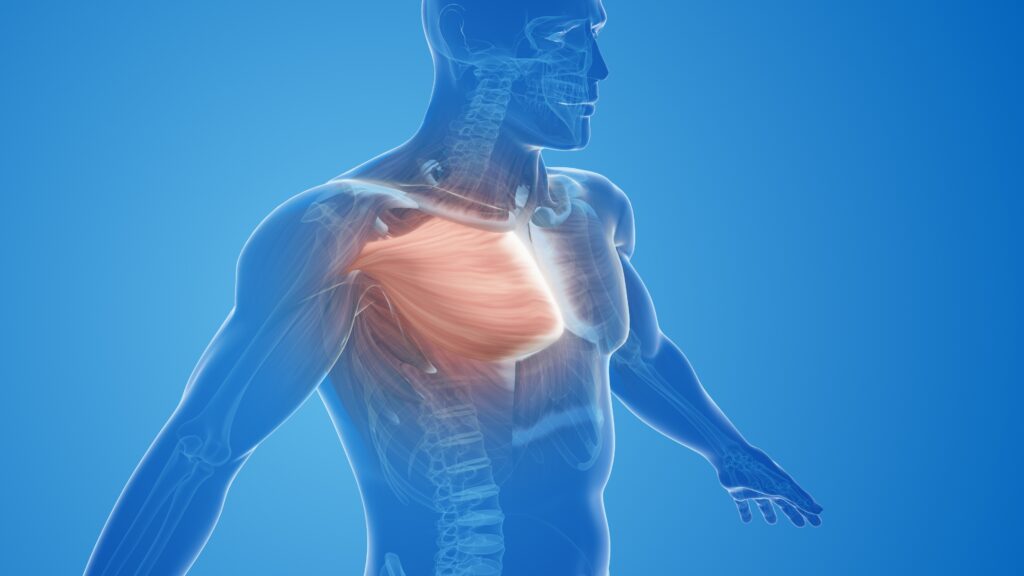
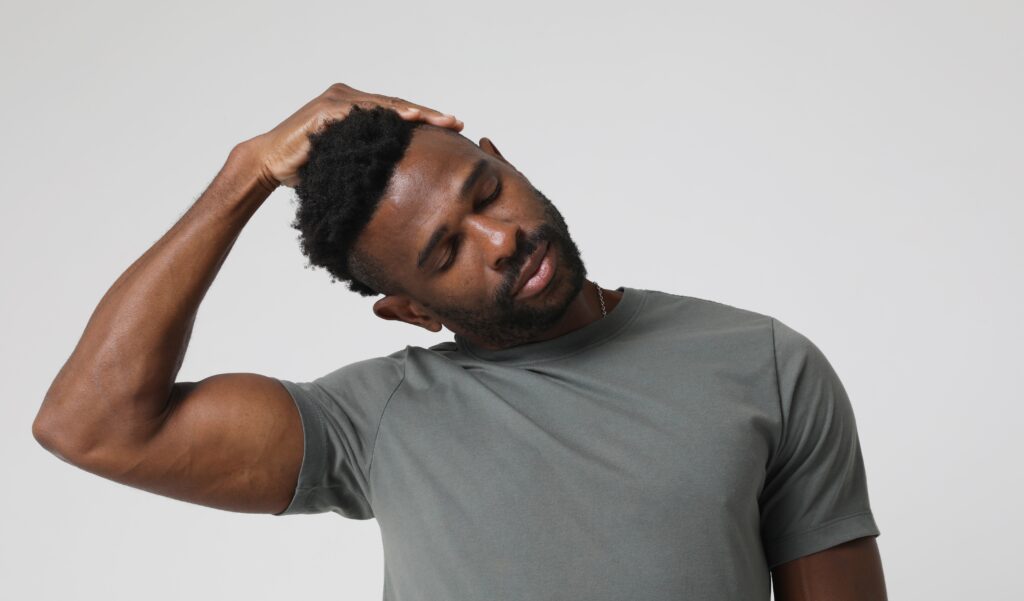
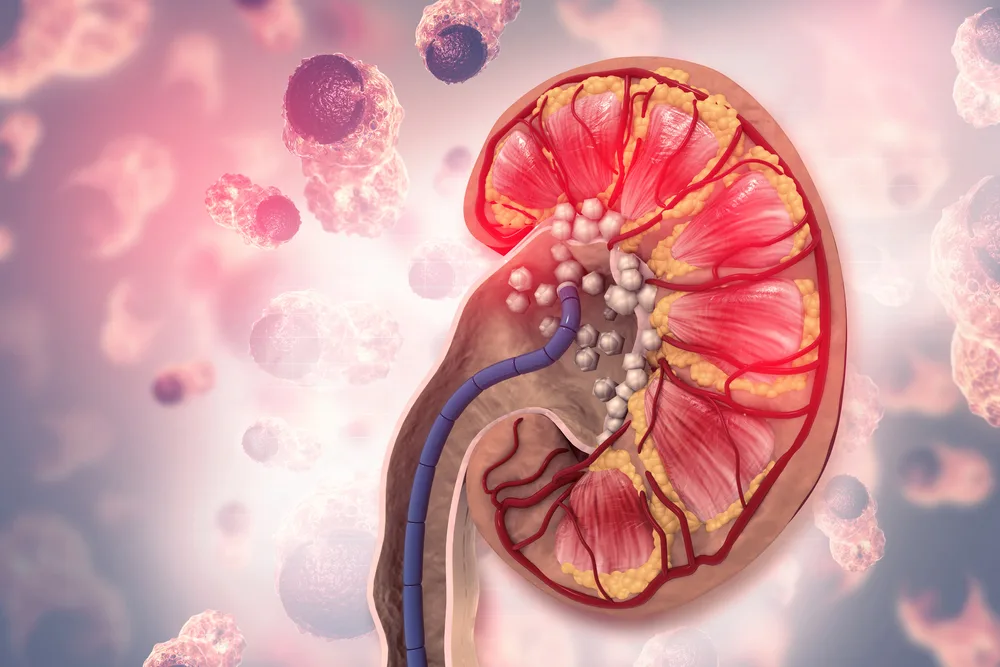
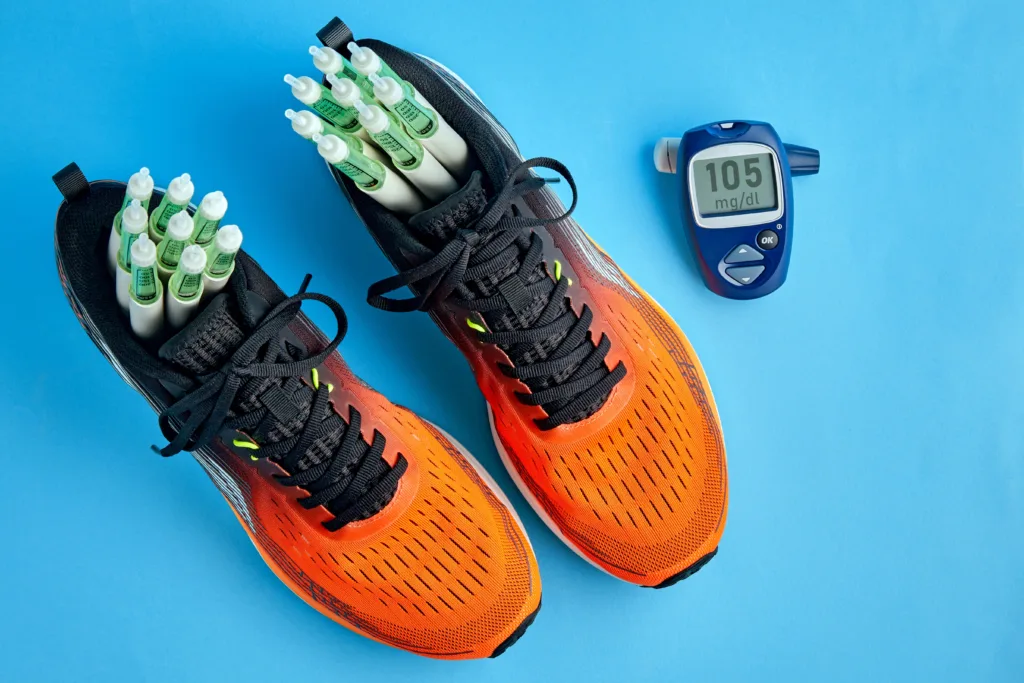
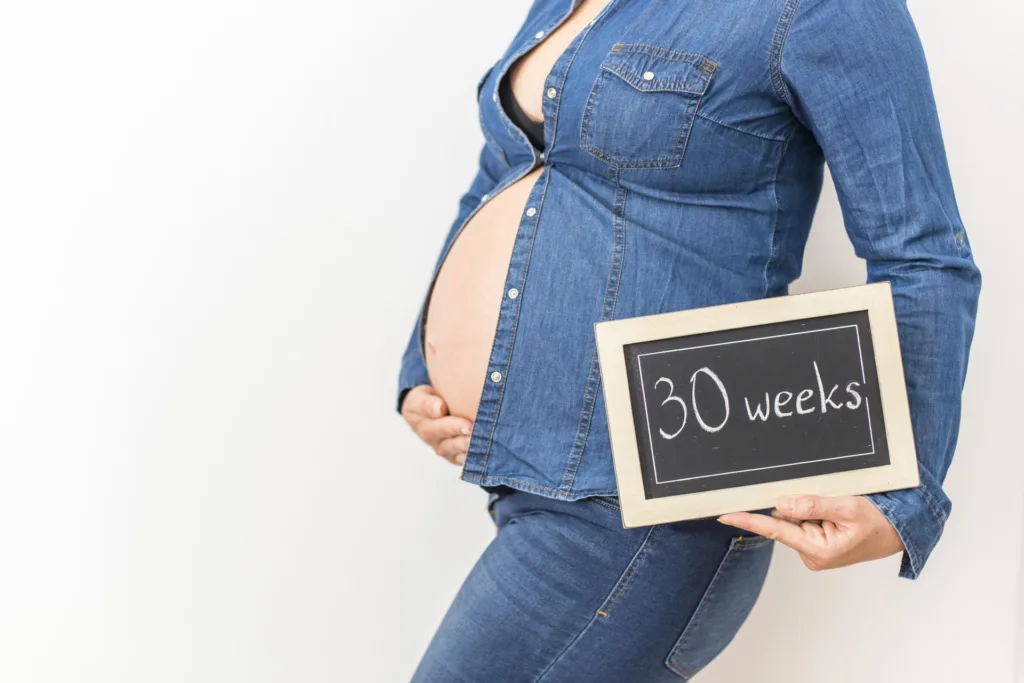
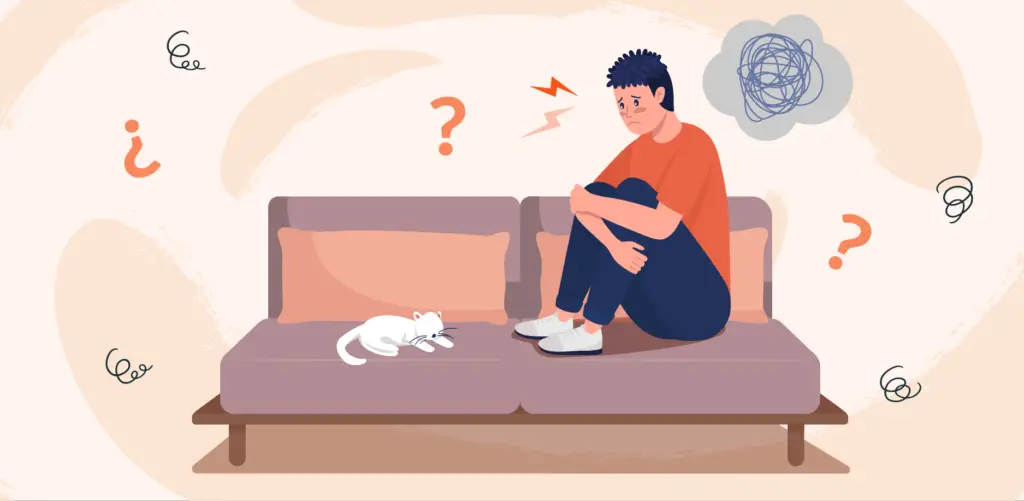
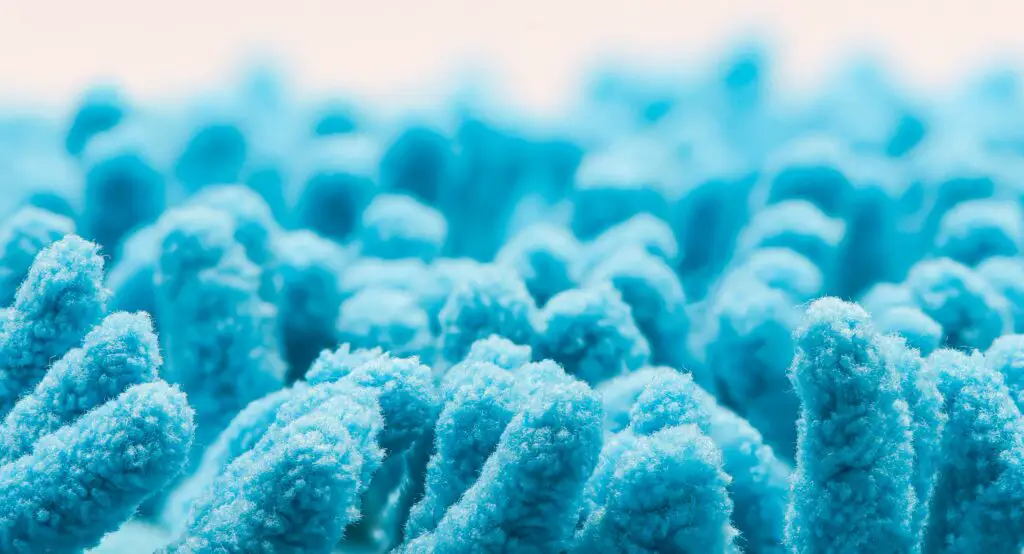
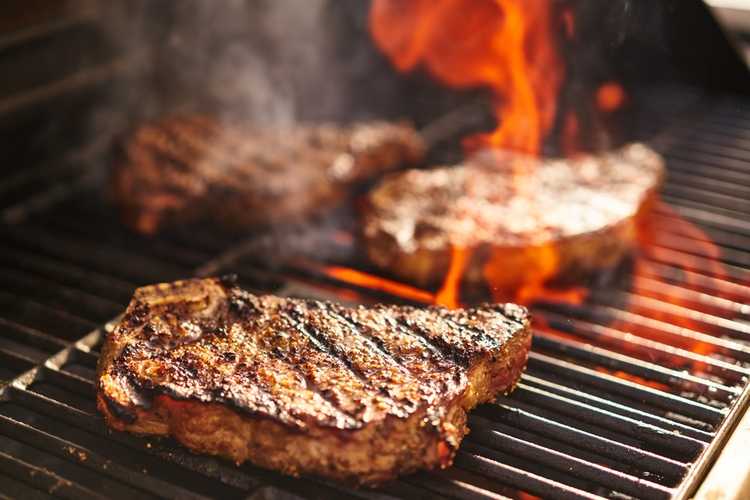
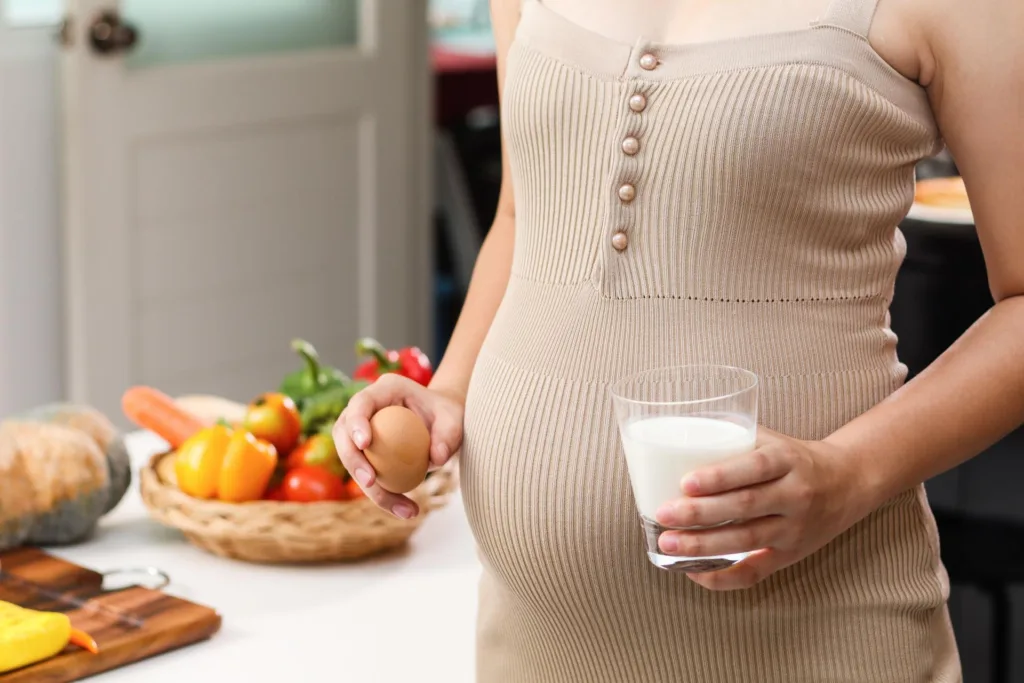
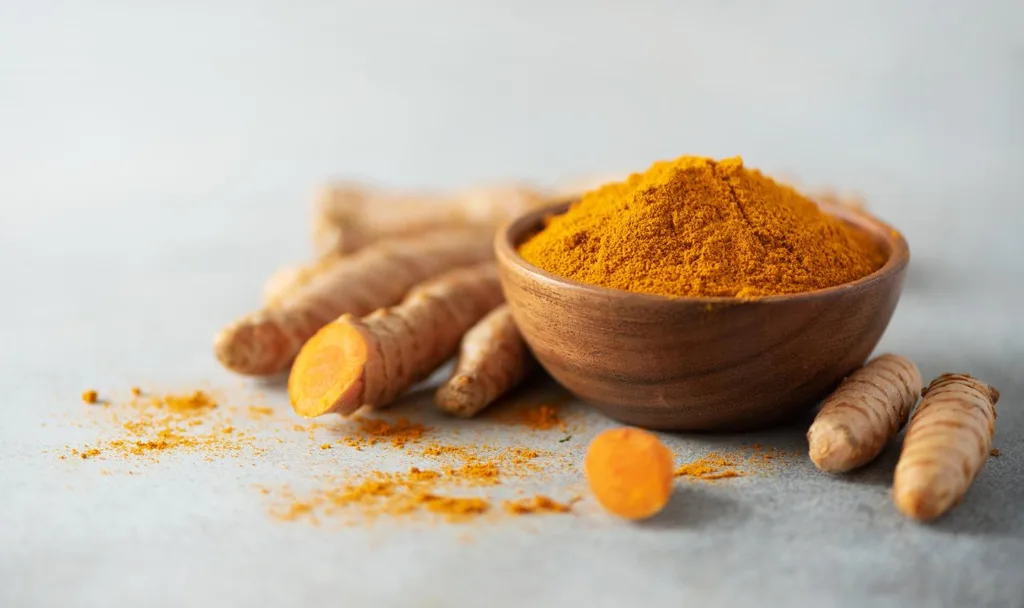

Keep up the good work!